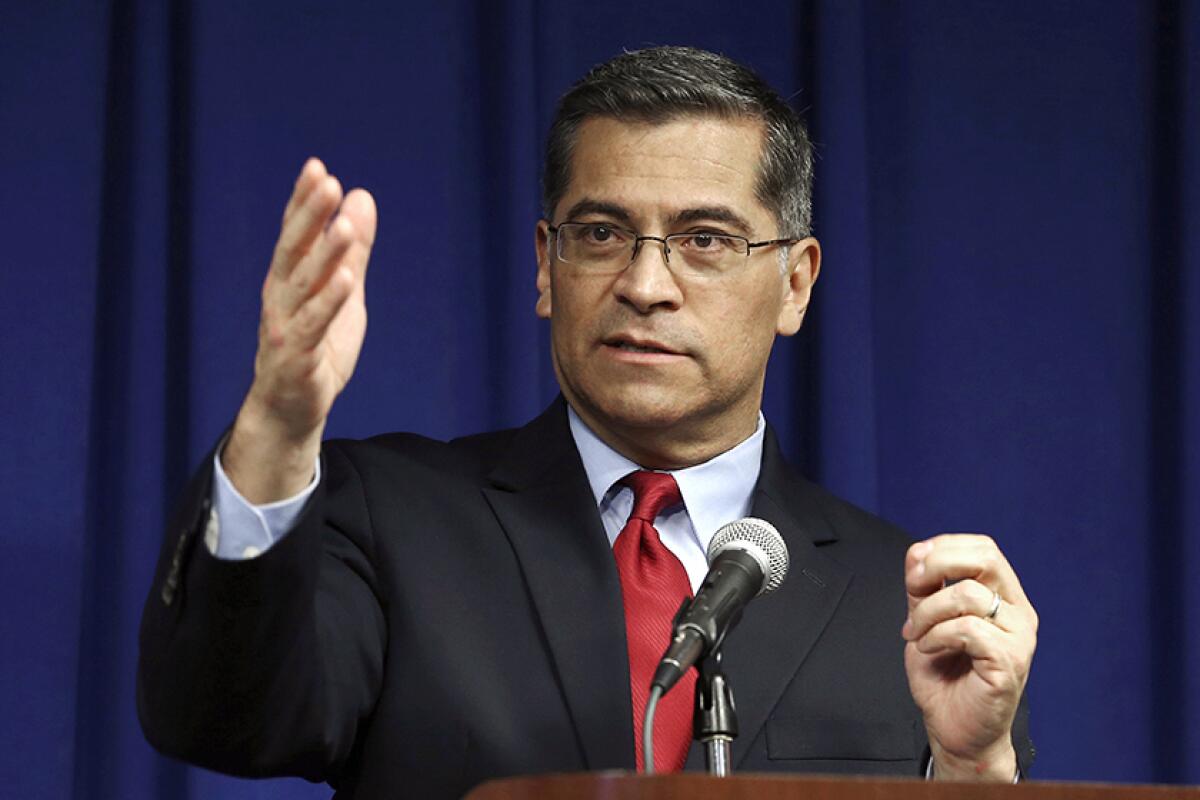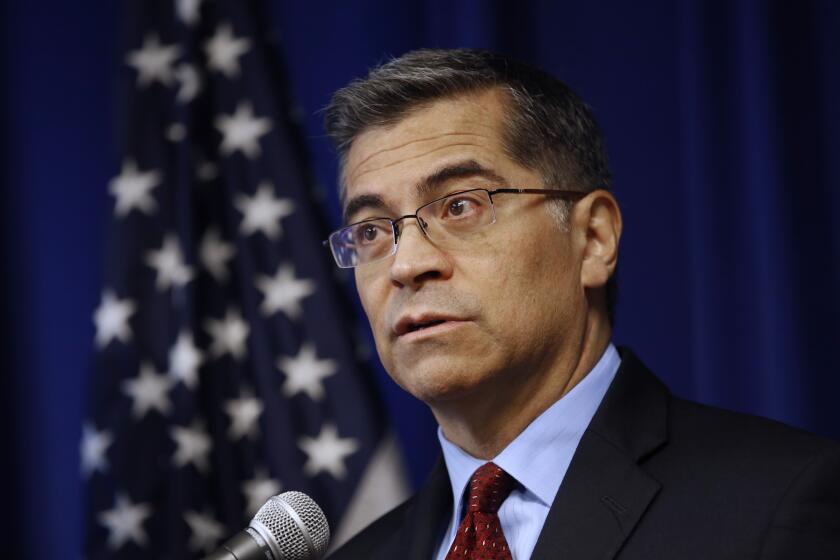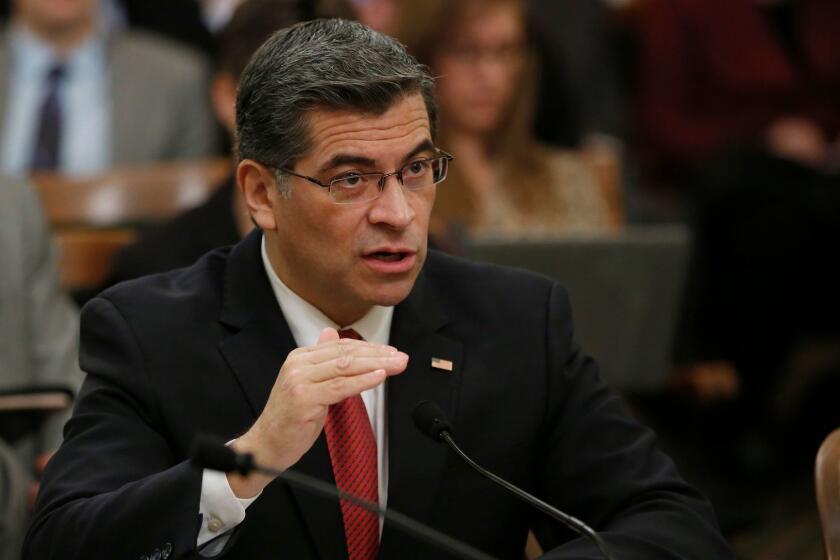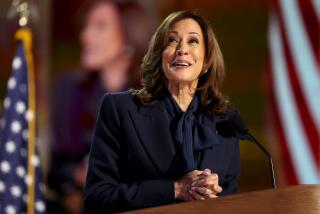How Republicans plan to sink Xavier Becerra’s nomination

- Share via
WASHINGTON — In an era when opposition lawmakers instinctively use confirmation hearings to hobble new presidencies, disqualifying at least one Cabinet nominee in the first 100 days of every administration since George H.W. Bush took office, Republicans are confident they have a ripe target in Xavier Becerra.
The GOP is fixated on rejecting President Biden’s pick to helm the Department of Health and Human Services, but not for the type of personal failings that typically doom early nominees. It is Becerra’s perceived political and policy sins that are fueling the bid to block him. His California credentials aren’t helping in a Senate where Republicans have no shortage of hostility toward the state, particularly after Becerra led the filing of more than 100 lawsuits against the Trump administration.
For the record:
3:58 p.m. Feb. 10, 2021An earlier version of this story mischaracterized a legal dispute between California Atty. Gen. Xavier Becerra’s office and a Roman Catholic organization. The Catholic group intervened in a lawsuit Becerra filed against the Trump administration. His office did not sue the group.
Minority Leader Mitch McConnell (R-Ky.) recently ripped into the nominee on the Senate floor, calling Becerra a “famously partisan” abortion advocate who is unqualified for the job. Oklahoma Sen. James Lankford called Becerra’s policy pursuits “bizarre,” accusing the California attorney general of “encouraging the death of children.” Sen. John Thune of South Dakota said Becerra is on the “extreme left.”
As other Biden nominees cruise to confirmation, Republicans are maneuvering to slow down the process for Becerra, who has declined interview requests. They are building their case in caucus meetings, in the Senate chamber and in the media.
“There really is a consensus that Becerra is the worst of the nominees,” said a GOP official close to Arkansas Sen. Tom Cotton, who is leading the nominee vetting process. The official spoke frankly on condition of anonymity. “Our most moderate members and our most conservative members feel it will be hard to stop any of these nominees, but if there is one, Becerra ought to be the one who goes down.”
Get our L.A. Times Politics newsletter
The latest news, analysis and insights from our politics team.
You may occasionally receive promotional content from the Los Angeles Times.
Biden backers argue that in the 63-year-old Becerra, the president has found the technocrat to fit the time: a seasoned, low-drama public executive and child of immigrants who helps fulfill the president’s pledge to name a Cabinet that reflects the diversity of America. Rarely before in his 30-year career in politics has Becerra been known as a firebrand, or “culture warrior” — a label Republicans now use for him, highlighting his support from groups that advocate for immigrant and abortion rights.
Becerra’s caution when he was a high-ranking congressman and then as the state’s top cop has some liberals back home griping that he is more part of the governing furniture than political tour de force.
Yet Republicans — who would need to pick up at least one Democratic vote to block the nomination — are confident that amid enduring voter anxieties over healthcare, Biden overplayed his hand by choosing a longtime advocate of “Medicare for all” to run the Health and Human Services Department.
That persistent advocacy by Becerra, his defense of California Gov. Gavin Newsom’s pursuit of stay-at-home orders during the pandemic and even his campaign donations from big insurance companies are seen by the GOP as making the nominee uniquely vulnerable while Democrats barely control the chamber.
Other things Becerra has done will come under scrutiny, too: Fighting a Catholic organization that was trying to preserve religious exemptions to a mandate that workplace health plans provide contraceptives. Helping a politically connected drug dealer score a pardon from the Clinton administration. Championing decriminalization of unauthorized immigration.
The red-meat issues are unlikely to push wavering moderates into rejecting Becerra, but are already firing up the conservative base and driving fundraising.
Some longtime colleagues of the nominee are bemused by the intensity of the campaign against him.
The 122 lawsuits Becerra filed against the Trump administration as California attorney general raised his political profile, but are seen among state leaders as a political gimme — something that would be expected of any Democrat in that office during the Trump era.
“There are a lot of partisans in Washington,” said Charlie Dent, a former GOP congressman from Pennsylvania who was Becerra’s neighbor in Washington. “That is not Xavier’s style. He doesn’t have sharp elbows. Yes, he’s left of center. But he is not a ‘my way or the highway’ type.”
Through much of a political career launched at the height of the turf battles accompanying the rise of Latino influence in California, Becerra was overshadowed by more-charismatic and harder-charging colleagues.
Here are five things to know about Xavier Becerra, California’s attorney general and Biden’s pick to lead the Department of Health and Human Services.
“There were proxy wars going on about who the kingmakers would be and who was motivated by what sets of issues,” said former Assembly Speaker John Pérez (D-Los Angeles), who was a teenage volunteer for the faction led by Ed Roybal, the late Democratic congressman from L.A., while it was nurturing Becerra’s early political ambitions. But Becerra “was never deeply in the fight,” Pérez said.
Raised in Sacramento by a secretary who emigrated from Guadalajara and a road construction worker who came to California from Tijuana, Becerra has said he found his way to Stanford after happening upon a blank application a friend had discarded.
“He has always been at the right place at the right time,” said Fernando Guerra, director of the Center for the Study of Los Angeles at Loyola Marymount University. The pattern played out up through his appointment as California attorney general and his nomination to lead U.S. Health and Human Services — jobs he had not been aggressively seeking.
Becerra was at the right place at the right time when Roybal retired in 1992 and his chosen successor dropped out of the race, allowing Becerra, then a freshman in the state Assembly, to win the congressional seat with Roybal’s endorsement. Serendipity shined on Becerra again as he faced exile in the House for crossing Rep. Dan Rostenkowski (D-Ill.), the powerful head of the Ways and Means Committee, amid an immigration dispute: An unrelated corruption indictment soon ended Rostenkowski’s political career — and opened Becerra’s path to becoming the first Latino on the panel.
It was in that committee, years later, that Becerra burnished his healthcare credentials. He joined a small group of lawmakers burrowed in a room across from the House floor rewriting drafts of the Affordable Care Act, widely known as Obamacare.
“He was a major partner in analyzing what should be in it, and then bringing about its passage,” said former Rep. Sander M. Levin (D-Mich.), who was acting chair of Ways and Means. “Most of the work was done out of the spotlight.”
Access to healthcare was already a signature issue for Becerra, whose congressional district encompassing parts of East Los Angeles was one of the state’s most economically distressed. He bored into thorny issues around eligibility for Medicare and Medicaid, and the often conflicting needs of low-income residents in urban versus rural areas.
“He was one of those people who was building relationships, building knowledge, toiling to get things done and not always the first at the microphone,” said Cybele Bjorklund, who was Democratic staff director on the Ways and Means healthcare subcommittee.
When then-Gov. Jerry Brown tapped him in 2017 to fill the post of attorney general, left vacant by Kamala Harris’ election to the Senate, Becerra bolstered his healthcare portfolio. His $575-million antitrust settlement with Sutter Health, accused of using its market power to drive up prices, is heralded by activists as a monumental blow against price fixing by hospital conglomerates. He led the group of states defending Obamacare from a GOP legal assault. He enraged religious conservatives by battling with a nonprofit led by Roman Catholic nuns seeking to protect religious exemptions to a requirement that contraceptives be covered in employer health plans.
Now GOP operatives are portraying Becerra at once as a leftist radical who will impose socialized medicine and a healthcare dilettante who will be manipulated by big insurance companies.
“My main beef is this needs to be someone with deep experience willing to take on the healthcare industry,” said Sen. Mike Braun (R-Ind.).
Though recent Health and Human Services chiefs have included ex-governors with arguably no more medical experience than Becerra, Republicans say the pandemic era demands a doctor in the role. Braun said Becerra’s “tightness” with the insurance industry may be disqualifying, pointing to political contributions.
California reached a milestone Friday in its ongoing legal feud with President Trump when Atty. Gen. Xavier Becerra announced he had filed his 100th lawsuit against the administration, this time challenging changes in environmental rules.
“The same partisans accusing him of wanting to destroy the health insurance industry with single payer are saying he’s in the pocket of the insurance industry,” said a Becerra advisor involved in the nomination process not authorized to talk publicly. “These scattershot, logically inconsistent attacks are desperate.”
It is only recently that Medicare for all has become Becerra’s heaviest political baggage. In the pre-Trump era, when nominees faced a higher ethics bar, Becerra’s role helping a drug trafficker secure release from prison might have dominated his confirmation debate. He joined other California politicians in petitioning President Clinton to consider the pardon ultimately given to convicted cocaine dealer Carlos Vignali. The appeal came at the behest of Vignali’s well-connected father.
Becerra’s insistence that he only inquired about the case didn’t square with the accounts of White House staffers, who said he lobbied for the pardon Vignali ultimately received over the objection of the White House pardon attorney. The federal judge who sentenced Vignali was outraged.
Becerra pointed to racial biases in the criminal justice system in advocating for Vignali. But his willingness to challenge the system had its limits when he was attorney general of California. Civil rights activists were disappointed by his caution, including his reluctance to investigate police shootings of unarmed civilians.
Activists were also dismayed by Becerra’s consistent efforts to stymie the disclosure of records revealing misconduct by law enforcement officers, even after a new law was passed mandating their release.
“The attorney general’s office could have taken a leadership role on this and encouraged police departments to do what was required,” said David Snyder, executive director of the San Rafael-based First Amendment Coalition. “They did the opposite.”
Becerra’s approach to such matters, though, may only bolster his case that he is more inclined toward compromise than culture wars.
“I keep asking myself why someone like Biden, who is not deeply close to him, would appoint Becerra. Jerry Brown, too. What did they see in him?” said Guerra, of the Center for the Study of Los Angeles. “They saw someone who is competent and steady and would not embarrass them.”
More to Read
Get the L.A. Times Politics newsletter
Deeply reported insights into legislation, politics and policy from Sacramento, Washington and beyond. In your inbox three times per week.
You may occasionally receive promotional content from the Los Angeles Times.













